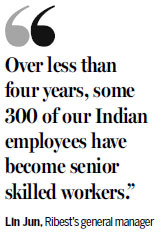Chinese ribbon company in India rolls out better life with jobs and skills for women
VISAKHAPATNAM, India - "Here I work to make money, so that I can help my sisters to marry more decently with a better dowry," said Sri Lakshmi, a 20-year-old Indian woman.
Lakshmi said she has four older sisters, and her family has to prepare a dowry worth 500,000 rupees ($7,700) for each of them in accordance with the local tradition.
In Visakhapatnam, a port city on the eastern coast of India, Lakshmi is one of several hundred local women working at the Ribest company, the Indian branch of the YAMA Ribbons and Bows company based in Xiamen, southeastern China, which opened here in August 2014.

The company's products, colored ribbons and bows, sell well in the Indian market. Merely by creating jobs, the Chinese-run Ribest presents a miniature version of mutually beneficial economic cooperation between China and India, and contributes to local economic empowerment by changing the lives of many women.
Lakshmi got a job at Ribest in 2016, long after she graduated from school. The job, making decorative ribbons by hand, is her very first job.
Enjoying company welfare including commuter buses and medical insurance that can partly cover family members, Ribest's female employees, aged about 20 and mostly with no higher education, usually love and value their jobs, according to Lin Jun, Ribest's general manager.
"You can see this in their work," he said.
It is a delightful sight - artificial "blossoms", or ribbon decorations, rapidly start to bloom under the moving hands and nimble fingers of the Indian women wearing colorful saris. For middle-aged Naga Jyothi, this job is her only means of support.
Ratna Kumari, Ribest's human resources director, said Ribest workers can how make 117 kinds of ribbons and have a monthly salary of about $110.
"Over less than four years, some 300 of our Indian employees have become senior skilled workers, and we have also promoted some to management," Ribest's head Lin said.
The strong market demand in India for Ribest products in addition to qualified, low-cost labor have prompted a big investment plan by parent company YAMA, which has signed an agreement with the local government on investing close to $32 million to upgrade its Indian plant.
Related projects are planned to be completed in 2019, and Ribest will then be 10 times its size in production, and make more complicated products involving higher-level techniques.
Mohammed Saqib, founder and secretary-general of the India-China Economic and Cultural Council, said Chinese enterprises can have more expansion opportunities in such an emerging market economy as India.
They are also contributing to the implementation of India's "Made in India" and other economic development plans, he said.
Xinhua
(China Daily 03/29/2018 page11)














